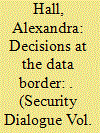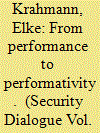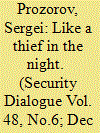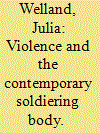|
|
|
Sort Order |
|
|
|
Items / Page
|
|
|
|
|
|
|
| Srl | Item |
| 1 |
ID:
157100


|
|
|
|
|
| Summary/Abstract |
Discussions about the legitimacy of private security companies (PSCs) in multilateral military interventions abound. This article looks at how the United States has sought to legitimize the outsourcing of security services to PSCs through performance-based contracting and performance assessments. Both mechanisms aim to demonstrate the effective provision of publicly desirable outcomes. However, the immaterial and socially constructed nature of security presents major problems for performance assessments in terms of observable and measurable outcomes. Performance has therefore given way to performativity – that is, the repetitive enactment of particular forms of behaviour and capabilities that are simply equated with security as an outcome. The implications of this development for the ways in which security has been conceptualized, implemented and experienced within US interventions have been profound. Ironically, the concern with performance has not encouraged PSCs to pay increased attention to their impacts on security environments and civilian populations, but has fostered a preoccupation with activities and measurable capabilities that can be easily assessed by government auditors.
|
|
|
|
|
|
|
|
|
|
|
|
|
|
|
|
| 2 |
ID:
157103


|
|
|
|
|
| Summary/Abstract |
Discussions about the legitimacy of private security companies (PSCs) in multilateral military interventions abound. This article looks at how the United States has sought to legitimize the outsourcing of security services to PSCs through performance-based contracting and performance assessments. Both mechanisms aim to demonstrate the effective provision of publicly desirable outcomes. However, the immaterial and socially constructed nature of security presents major problems for performance assessments in terms of observable and measurable outcomes. Performance has therefore given way to performativity – that is, the repetitive enactment of particular forms of behaviour and capabilities that are simply equated with security as an outcome. The implications of this development for the ways in which security has been conceptualized, implemented and experienced within US interventions have been profound. Ironically, the concern with performance has not encouraged PSCs to pay increased attention to their impacts on security environments and civilian populations, but has fostered a preoccupation with activities and measurable capabilities that can be easily assessed by government auditors.
|
|
|
|
|
|
|
|
|
|
|
|
|
|
|
|
| 3 |
ID:
157099


|
|
|
|
|
| Summary/Abstract |
The article addresses the reinterpretation of the problematic of security in the messianic turn in contemporary continental political thought. I focus on Giorgio Agamben’s reinterpretation of Hobbes’s Leviathan in Stasis, which restores an eschatological dimension to this foundational text of modern security politics. Hobbes’s commonwealth has been traditionally read as a secularized version of the katechon, a force that restrains the state of nature while drawing on its resources. Instead, Agamben argues that for Hobbes, the state is neither the analogue of God’s kingdom on earth nor the katechon that delays its arrival, but the profane power that will disappear when the kingdom of God is established on earth. It is thus in principle incapable of attaining the peace and security that it claims to provide, perpetually producing insecurity and violence in the guise of protection. In Agamben’s reading, it is precisely this failure of the state’s security apparatuses that assists the advent of the messianic event in an oblique fashion. The exposure of this failure does not aspire to the improvement of the apparatuses of security or resign us to inescapable insecurity but only affirms the need to render the present apparatuses inoperative, bringing forth a future without them.
|
|
|
|
|
|
|
|
|
|
|
|
|
|
|
|
| 4 |
ID:
157101


|
|
|
|
|
| Summary/Abstract |
This article offers a process-mechanism explanation of securitization. To make the case for a process-mechanism account more concrete, I use interpretivist process tracing to explain the crisis episode of the Sun Sea, a Thai cargo ship carrying Sri Lankan asylum-seekers, and the securitization of irregular migration in Canada. Drawing on interviews and grey literature, the article shows how securitization was possible and under what conditions, and argues that ideational dispositions of security organizations induced state officials toward a security interpretation of the the Sun Sea. The article aims to demonstrate that process-mechanism explanations represent a compelling methodological alternative with which to trace and explain securitization. The article sees itself as part of a broader refinement of a sociological variant of securitization theory. It seeks to examine and enhance the contribution that this ‘post-Copenhagen’ approach – its core assumptions and theoretical framework – makes to the analysis of securitization.
|
|
|
|
|
|
|
|
|
|
|
|
|
|
|
|
| 5 |
ID:
157102


|
|
|
|
|
| Summary/Abstract |
This article asks what is the significance of making the soldiering body (hyper)visible in war. In contrast to the techno-fetishistic portrayals of Western warfare in the 1990s, the recent counterinsurgency campaign in Afghanistan witnessed a re-centring of British soldiering bodies within the visual grammars of war. In the visibility of this body, violences once obscured were rendered viscerally visible on the bodies of British soldiers. Locating the analysis in the War Story exhibition at the Imperial War Museum, London, the article details two moments of wartime violence experienced and enacted by British soldiers, tracking how violence was mediated in, on and through these hypervisible soldiering bodies and the attending invisibility of ‘other’ bodies. The article argues that during the Afghanistan campaign, soldiers’ bodies became not just enactors of military power but crucial representational figures in the continuance of violent projects abroad and their acceptance back home.
|
|
|
|
|
|
|
|
|
|
|
|
|
|
|
|
|
|
|
|
|